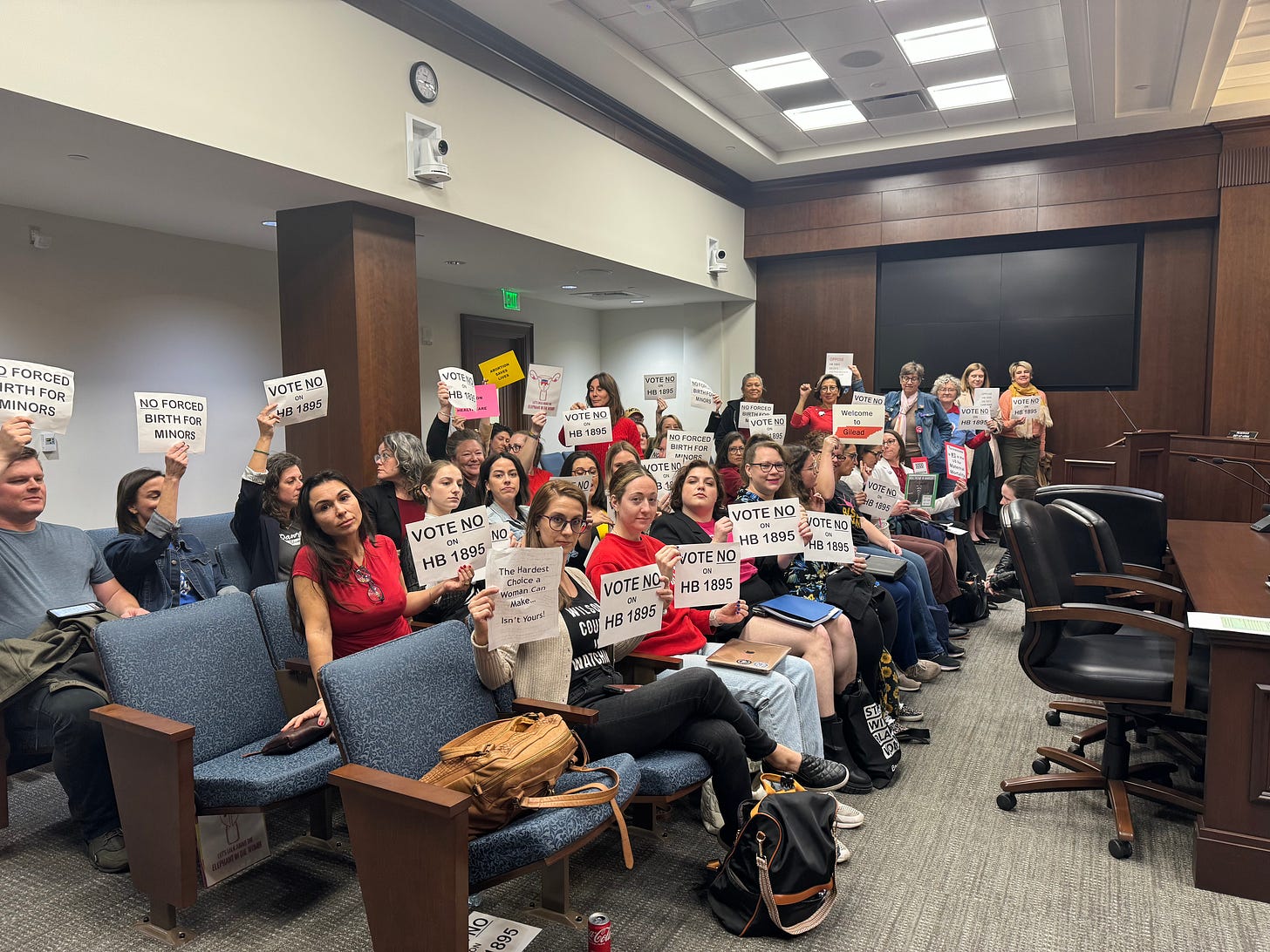Not your Handmaidens!!
2-6-24: Turning out to turn back a bad bill
Friends, Thanks to everyone who made phone calls, sent emails, and turned out today at the Legislature. Your voice is truly making a difference and the Legislators are listening.
Below is a short report on two Committees that held hearings today: Population Health (2 bills are featured) and Criminal Justice (3 bills are featured). Thanks for your interest, support, and actions!! Michele
Population Health Subcommittee
1. Bill #HB1895/SB1971. We organized ourselves to wear red, donned Handmaiden hats, and held signs telling legislators NOT to pass“the criminalization bill.” This bill states that if anyone (other than the parents) were to “recruit, harbor or transport a young person to help them obtain abortion care or abortion pills” they could be charged with a Class C felony for so-called “abortion trafficking.”
We made it very clear that we were strongly opposed to this bill.
Once the gavel struck, we donned our handmaiden hats and covered our mouths with signs saying “Not Your Handmaiden” to emphasize our rejection of criminalizing those who would help a teenager seeking an abortion.
Just as the committee was about to begin, we learned that the bill had been taken off schedule for the day. I believe that all of our efforts pushing back against this bill, in person and with phone calls and emails, gave the legislators pause.
We are growing in numbers and voices, online and in-person, as we push back against bills that hurt children, adults, and families- and particularly women. One friend emailed today:
Michele, I could not be there early enough today but I did call all members of the committee earlier this morning; thanked Clemmons and one other committee member. I was told by the woman who answered his phone that he was voting against it--I just don't have his name in front of me right now. I left messages for everyone else and wrote an email to Zachary to express my opposition. I will be watching the news tonight to see what happens. Thank you for getting those phone numbers for the committee members out. I shared that information with others. Very helpful!
2. HB1884 by Hakeem/SB1826 by Lamar WAS heard in the Committee and we all waited, with signs and in handmaiden hats, as it was debated. This bill, as introduced,
“…specifies that the offense of criminal abortion does not include an abortion that was necessary due to a medical emergency affecting the physical or mental health of the pregnant person or performed on a patient whose pregnancy was the result of rape or incest.
Referred to as the “exceptions bill,” it unfortunately does not make abortion legal again but instead was an attempt to offer protection in some cases for some women seeking an abortion. However, for some advocates, the required proof of rape or incest is a very challenging expectation for those who have experienced these assaults, as they so often go unreported for very understandable reasons. Similarly, determining what medical emergency might meet the undefined standard of affecting the pregnant person’s physical or mental health is so vague and worrisome that it would leave doctors with little protection from criminal charges when using their medical expertise.
But what was also quite concerning about this bill was the way Sponsor and Representative Hakeem kept referring to the fetus as “the child,” thus feeding into the arguments of anti-abortion legislators.
Although trying to be helpful, his comments merely allowed for a strong rebuttal from Representative Andrew Farmer, although the advocates in the room made their displeasure with Farmer’s comments very clear- and were reprimanded for it.
And we all know we are in trouble when Representative Kumar is the voice of reason in an abortion debate.
Kumar talked about our equally divided society and wondered aloud about what the legislature was to do in such a circumstance. However, he ignored the research that shows the general public is not evenly split on this question. According to a May 26, 2022 Tennessean article by Adam Friedman:
“Around 80% of Tennesseans believe abortion should be either completely legal or legal under some conditions, such as in cases of rape and incest and when the health of the mother is at stake, according to a new Vanderbilt University poll.”
“Over 1,000 joined a “bans off our bodies” protest in Nashville to support abortion rights in the wake of a leaked draft opinion of the Supreme Court”
Unsurprisingly, the bill failed on a voice vote.
HOUSE Criminal Justice Subcommittee
1. HB1602 by Chism/SB1577 by Lamar. Regarding Juvenile Offenders, this bill requires that a video or audio recording be made of any interrogation of a child who has been taken into custody on suspicion that the child committed a delinquent act or unruly conduct unless a technical issue with the equipment or exigent circumstances prevents the recording.
Thankfully, this bill PASSED UNANIMOUSLY in the committee. It also PASSED UNANIMOUSLY in the Senate yesterday.
2. HB0279 by McKenzie/SB0904 by Akbari. Regarding Criminal Procedure, this bill would allow certain persons deprived of the right of suffrage to apply for a voter registration card and have the right of suffrage provisionally restored if the person enters into a payment plan to become current on all child support obligations.
Representative McKenzie introduced the bill to restore the voting rights of individuals who are released from prison, once they complete paying back court costs, fines, and fees, without having to first complete repayment of their arrears in child support (which accrues while they are in prison). Otherwise, so many of the individuals who were formerly incarcerated may never get their right to vote back.
Even though they are ordered to pay child support when they are released, the back child support is pro-rated, based on their income, so it may take years and years to pay it in its entirety. McKenzie and Senator Akbari are trying to remove this barrier preventing people from regaining their right to vote.
Representative Johnson clarified that people who have not paid their child support can vote, so why should people who have been incarcerated not also be able to vote, even if they have not finished paying all of their back child support?
Representative Lamberth led the arguments against the bill, saying it is only fair to require all fines, fees, and restitution, including child support to be completed before the right to vote is restored. Clearly, Representatives Hardaway and Johnson are not in agreement with Lamberth, as you can tell by the look on their faces.
Lamberth (insincerely) used women as the scapegoat in his statement about why committee members should reject this bill.
McKenzie clarified that while in prison, back child support costs continue to accrue and he pleaded with the committee to help families by providing a path for the released parent to pay child support while simultaneously restoring their voting rights as it will “…build the glue of the family back together.” McKenzie reminded the committee members that the person has to retain a job and the court would monitor their child support payments to be sure they are making them. McKenzie also talked about how powerful the right to vote is, especially for a formerly incarcerated person who is attempting to reestablish a connection to their family and community.
Hardaway spoke to the broader positive impact of connecting people to their right to vote once they “come back out into the world” and to their successful re-engagement with civic society. He went on to say that positive parenting includes children being able to see their parent as a role model and that redemption is real. He talked about the challenges of a formerly incarcerated person re-engaging with the family and community once released from prison and the importance of NOT relegating them to what he called a “temporary citizen.”
After a bit more discussion, Representative McKenzie agreed to have the bill taken off notice to allow him time to address some amendment language before he brings it back to the committee.
3. HB2030 by Jones, SB1912 by Yarbro. Regarding Criminal Offenses, Representative Jones explained that this bill expands “Revenge Pornography” to include the use of AI to create unauthorized offensive depictions. The expanded language of the bill is:
“…the offense of unlawful exposure to include the distribution, with the intent to cause emotional distress, of an image of the intimate parts of another identifiable person or an image of an identifiable person engaged in sexually explicit conduct and the image was created or modified by means of a computer software program, artificial intelligence application, or other digital editing tools.”
Representative Lamberth added an Amendment to change the sentence of perpetrators to that of a Class D Felony rather than a Misdemeanor to ensure someone from another state could be brought to Tennessee for trial. Following testimony by two expert witnesses about AI, the bill passed unanimously in the committee.







